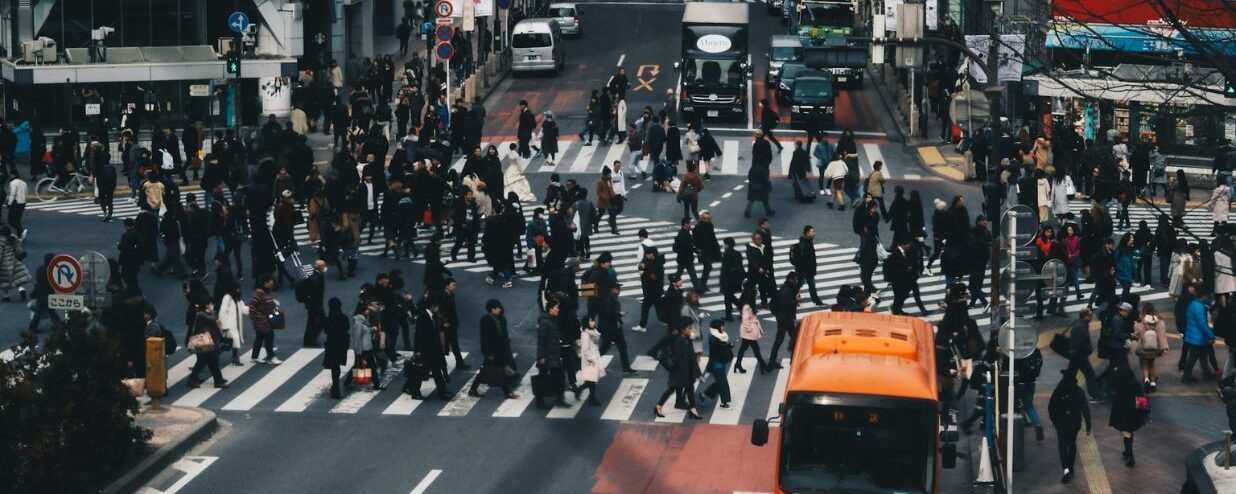If you live long enough in Japan, you might notice that Japanese work culture is different from its Western counterparts, such as the U.S. or European countries. Before you start rushing to find a job here, being aware of specific cultural differences may help you adjust or even rethink if working here is right for you. The good news is that Japan is hiring foreigners on a large scale, allowing for vast work opportunities.
The work culture in Japan is different in regard to employee-employer relationships, dress codes, colleagues’ behavior, and ethics at Japanese workplaces. Essentially, aspects of traditional Japanese culture persisted into the modern working environment, resulting in distinct expectations and norms from the West. As a result, it can be difficult for a foreigner to understand many of these social norms since they are not always visually observable and can be hidden in layers of context.
In this long guide, we will dive into the complex Japanese work culture and what to expect when you join a company here.
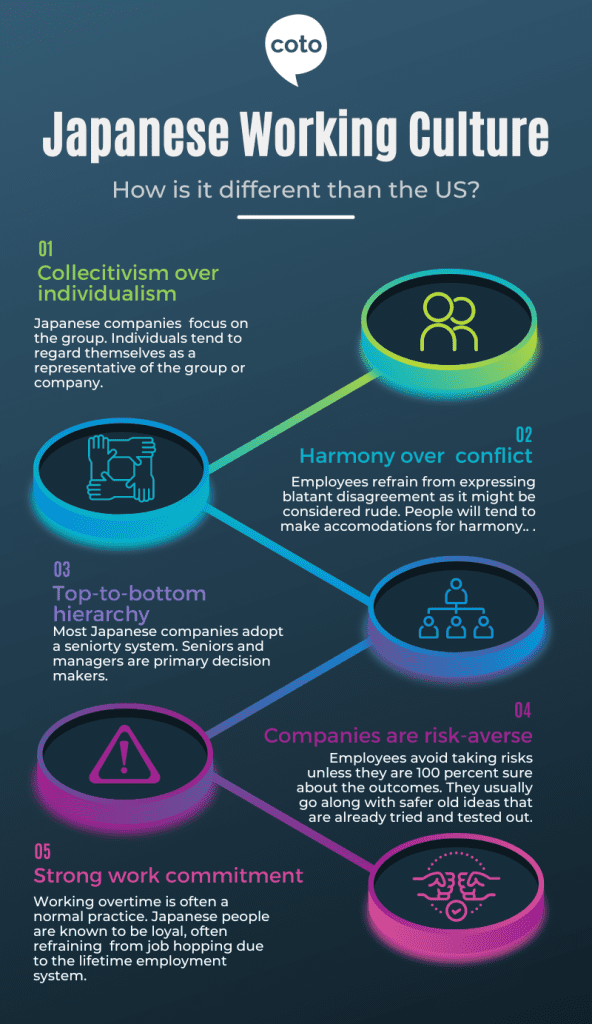
Japanese Work Culture: A Deeper Look
At the surface level, we can already see tons of differences between the work culture in Japan and other countries. However, that is only what is directly observable, as there is a lot of cultural context behind what is visible that contributes to Japan’s unique working environment. Let’s explore some of these cultural phenomena further, shall we?
Collectivism Trumps Individualism
Japanese culture has long valued collectivism, shaped by history and geography. The cooperative nature of rice cultivation, frequent natural disasters, and periods of internal conflict all reinforced the idea that survival depended on group effort. Over time, this created a society that prioritizes cooperation, loyalty, and mutual responsibility.
This collectivist spirit shows up in the workplace through rules, formalities, and rituals that ensure smooth relationships. From the way one enters an interview to the etiquette of exchanging business cards, actions signal trustworthiness and good intentions toward the group. Even modern Japanese combat sports preserve this spirit: athletes bow before entering the ring and step in with the left leg first, a tradition rooted in samurai etiquette, where stepping with the sword-bearing side first could be seen as aggressive.
Collectivism, however, comes with a need for order. If everyone must work together, then there must also be clear lines of authority, leading directly to Japan’s strong emphasis on hierarchy.
Deeply Rooted Hierarchy
Japanese society has always been hierarchical, a trait reinforced during the feudal era and formalized through Confucian values that stressed respect for elders, teachers, and superiors. In modern times, this translates into the workplace, where deference to authority is a defining feature. Employees respect their bosses, managers, and even older colleagues (senpai), while outside of work, this extends to parents and grandparents.
Hierarchy is baked into every facet of Japanese culture, even the language. Keigo consists of honorific language used to elevate superiors, while humble forms lower the speaker in relation to others. In Japanese workplaces, this is the standard way of speaking.
Yet hierarchy is not an end in itself; it is a tool for maintaining the larger goal of harmony.
Harmony (和): The Root of Japan’s Social Values
Harmony is likely at the core of Japanese cultural values. Collectivism and hierarchy both exist to maintain harmony and ensure cooperation, even at the cost of individual convenience. By promoting harmony, there will be greater social cohesion, allowing for greater cooperation and progress.
Consider Japanese schools, where both teachers and students clean classrooms after lunch. In less than 30 minutes, an entire school is spotless, no janitors required, because everyone contributes equally. This small ritual reflects a larger principle: harmony is achieved when everyone does their part without complaint.
Part of harmony is that everyone needs to do their part, and sometimes, without question, even if you need to compromise yourself. For example, you must follow every step of the established work process even if it will slow you down and reduce your productivity.
Where Japan places value on harmony, the West doesn’t seem to mind conflict since they believe it could result in solutions or innovations that would not have been considered had disagreements not arisen. This may be what leads to the inherent differences between Western and Japanese work culture.
Japanese Work Culture: The Good, the Bad, and the Ugly
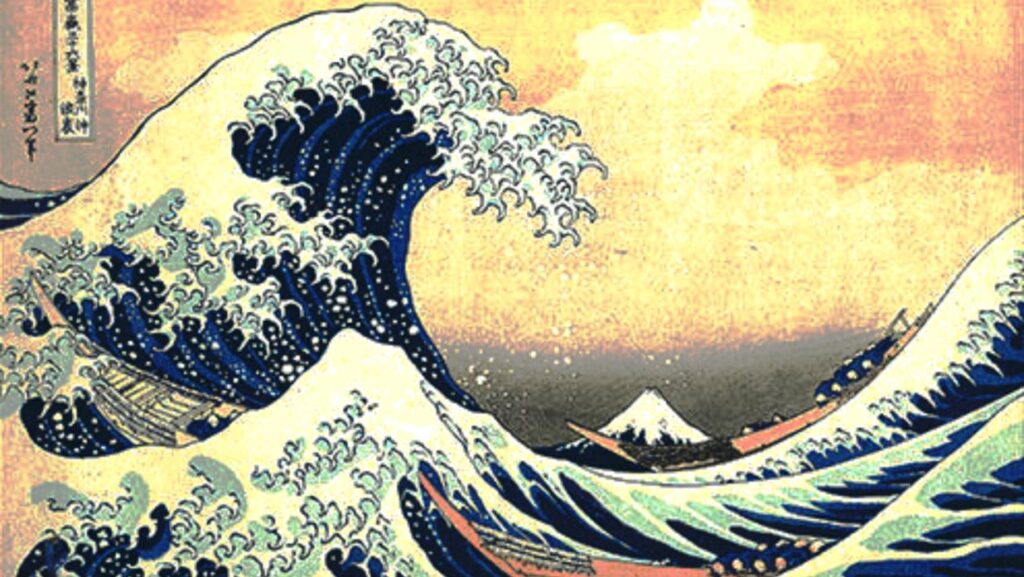
Work culture in Japan is almost that of legend, or rather infamy, where we hear that there is even a word for working yourself to death, known as karoshi (過労死). The general perception of the Japanese work environment is that it’s rigid, hierarchical, and unforgiving, with poor work-life balance. But how accurate is this perception, and how does that compare with Western work culture, such as the U.S.?
1. Strong Work Commitment
In Japan:
If there is a reputation that precedes the Japanese working population, it’s their strong work ethic. Punctuality and commitment to work are of utmost importance to Japanese work culture. Being on time means being at least 15 minutes early, and prioritizing work over family is an expectation. They start their day early and spend hours commuting. Working overtime is often a normal practice. In some sense, Japanese people view the workplace as their family. If a person works for long hours, then it is seen as a sign of love toward his or her family.
In the West:
In America, balancing work and life is given priority. About 72 percent of Americans consider work-life balance while looking for a job. Employees acknowledge that spending quality time with their loved ones is as essential as work. However, overtime and low work-life balance are pervasive issues in the U.S. Several surveys indicate that over 60% of Americans do not have a work-life balance. The surveys often cite working too many hours or working on vacation as reasons for the lack of balance. But how does Japan compare?
2. Workplace Formalities
In Japan:
In Japan, companies follow a quite strict formal dress code. Male employees wear charcoal grey, navy blue, or black suits along with a white shirt and subdued ties throughout the year. Female employees wear similar color blazers along with trousers, skirts, heels, and tied-up ponytails. Standing out or wearing bright colors is a slight no-no at the offices in Japan.
Overall, the work culture in Japan is more formal than in the US. Best practice is to use formal language and show greater respect to your boss and seniors (or senpai). An essential aspect of Japanese culture is treating anyone older, more experienced, or in a higher social position with the utmost respect, as they can impart their knowledge to you.
It was once normal to refrain from leaving the workplace before your boss or seniors, but this is largely being phased out. However, the pressure to not say ‘no’ to your seniors, especially to after-work drinking called nomikai (飲み会), is still rather prevalent. Even when drinking, it is essential to maintain proper manners to your boss and senior colleagues, such as serving them drinks before yourself.
In the West:
This contrasts with most companies in the West, like America, where there tends to be more flexibility as employees are free to wear casual attire at work. Mostly, suits are worn whenever there is a business meeting or presentation.
3. Generalists Over Specialists
In Japan:
Japanese workplaces focus on the group. During the hiring process, a lot of companies give less priority to skill sets and specialization. Instead, they want to evaluate the cultural fit of the candidates. This is because Japanese companies want employees that can perform well in a group for a good amount of time. They don’t have a firing culture. Employees work at companies for a very long period. In fact, Japan is known for its lifetime employment system.
In the West:
On the other hand, American companies look for candidates who have specialization as well as the right skills for the job. They follow a system of ‘structural individualism’ wherein the main focus is on the individual’s career. That’s why switching companies for better opportunities or strategic job hopping is a common practice in the US. However, this should not be mistaken for the absence of teamwork. Individual employees do participate in group projects from time to time.
4. Rigid Top-down Hierarchy in Japanese Companies
In Japan:
Employees must report to their seniors, inform the seniors about the latest developments, and consult seniors for work advice. Employees are not free to make decisions. They have to approve everything from their superiors, even the small things. This is called ho-ren-so (ほれんそう), which means “spinach” in the Japanese language, but is actually an abbreviation for:
- 報告 Hokoku (to report)
- 連絡 Renraku (to inform)
- 相談 Sodan (to consult)
In the West:
In contrast to this, American organizations tend to decentralize authority and decision-making. Every employee gets to make his or her decisions that could help the business grow. Of course, employees go to their seniors for professional advice now and then. Ultimately, this comes back to how Western-style organizations tend to hire specialists who already have the skills, whereas Japanese companies hire generalists whom they can train. This is what necessitates the hierarchy in Japanese companies that rely on seniors to train juniors. Since professionals who don’t need to be trained are often hired in Western organizations, they rely less on the company and are more willing to leave. As a result, Western companies tend to have a more individualistic atmosphere.
5. Risk Adversity
In Japan:
People have a conservative mindset in Japanese corporations. Employees avoid taking risks unless they are 100 percent sure about the outcomes. They usually go along with safer old ideas that are already tried and tested.
In the West:
On the flip side, Western businesses tend to take more risks and are much more open to trying something fresh. American employees don’t hesitate as much to take risks, even if they are not certain about the results. Americans are more likely to invest in disruptive startups, projects, and technologies. However, the drawback of taking more risks means that American companies might suffer more losses. Although America is often characterized as a land of risk-takers, many companies are adverse to risk. So, conservative sentiments towards risk are not uncommon in the United States either.
6. Close relationships with colleagues
In Japan:
Work culture in Japan is not just about working on and off. When employees are at work, they only work. However, once the work hours end, employees go out to socialize with one another. They usually hang out at karaoke or restaurants for nomikai, which is a Japanese word for a drinking party. With everyone seated around one big table, co-workers are expected to drink, share meals, and interact with each other. Nomikai has all kinds. It even exists outside the work circle in Japan. Joining such parties is considered socially appropriate. Still, they are completely optional, and anyone can skip them if they want.
In the West:
In America, there are no social norms for socializing or bonding after work. American employees are already familiar with their co-workers due to their informal working environment. Thus, they largely don’t need to set separate times to get to know one another. This gives them more space for their personal life.
7. Prioritizing harmony over conflict
Harmony is the cornerstone of Japan’s cultural values and is likely what contrasts Japanese work culture so sharply from the West. The Japanese way of communicating is quite indirect, where asking questions that seem to challenge a superior’s position can be considered rude. As a result, you will rarely see anyone raising their hands with queries in mind by the end of business meetings or presentations. Even if there are some misunderstandings, people may avoid asking any questions directly due to this stigma.
Meanwhile, in America, questions come and go anytime. There are no social barriers, and clearing doubts is a normal thing. The American work culture is more straightforward in these aspects. Americans feel that everything should be crystal clear and there are no misunderstandings.
The Darkest Side of Japanese Work Culture: Karoshi (過労死)

In Japan, karoshi (“death from overwork”) and karoujisatsu (suicide linked to overwork) aren’t just media buzzwords; they’re built into the country’s legal and compensation system. Each year, the Ministry of Health, Labour and Welfare (MHLW) tallies recognized work-related cases of brain/heart disease and mental disorders (including suicides and attempts).
This is all linked to Japan having one of the highest rates of overtime in the world, with very few employees actually taking their paid time off (PTO). You often hear that employees feel guilty about taking time off or may even have their PTO requests rejected.
So, in fiscal 2024, authorities recognized 1,304 cases tied to overwork: 247 cases of cerebro-cardiovascular disease (e.g., stroke, heart attack) and 1,057 mental-health cases, including 89 suicides or suicide attempts. Recognition requires evidence (e.g., long hours, heavy workload, harassment), so these figures are best read as the documented tip of a larger iceberg, not the full burden.
Japan has tightened rules in the last decade. Under the 2019 Work Style Reform laws, overtime is, in principle, capped at 45 hours per month and 360 hours per year, with “special circumstances” ceilings of under 100 hours in any single month, under or equal to 80 hours per month on a multi-month average, and less than or equal to 720 hours/year. Enforcement has curbed some extremes, but results are mixed, especially in sectors with chronic labor shortages (e.g., logistics, healthcare).
Is there “karoshi” in the West?
There isn’t an exact legal counterpart in the U.S., but overwork-related harms absolutely exist. The U.S. tracks suicides occurring at the workplace (work may not be the exact cause) and also publishes occupation-specific suicide rates, which show consistently elevated risks in several fields, such as construction/extraction, arts/design/entertainment, and installation/maintenance/repair. These data indicate that job context matters for suicide risk, even if the U.S. doesn’t formally label cases as “death by overwork.”
Zooming out globally, the WHO/ILO estimates that working around 55 hours per week is associated with substantially higher risks of stroke and ischemic heart disease, contributing to hundreds of thousands of deaths worldwide, so the mechanism behind karoshi isn’t unique to Japan.
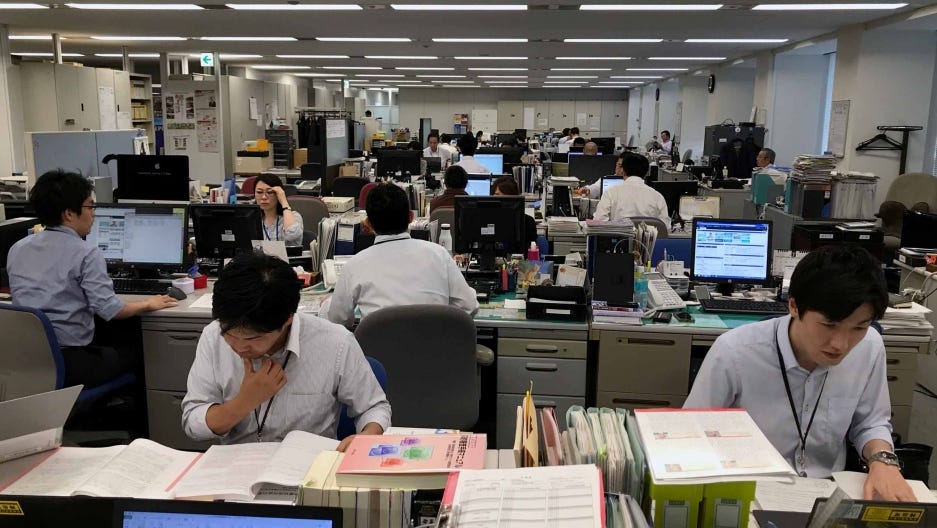
Common Business Etiquettes in Japanese Work Culture
Social interactions in Japanese work culture can be confusing. Japan has unique business manners and etiquette that differ from Western standards. To avoid cultural shock, it’s best if you know them firsthand. In Japan, there are quite a several do’s and don’ts that business professionals are required to keep in mind. Here’s a crisp list of the few most important etiquettes that you need to catch sight of.
1. Bowing to Clients Till The Elevator Door Closes
Whenever you have visiting clients at the office, it is expected to accompany them to the front door. If your office is in a high-rise building, then seeing off the visitors to the front door may seem too much. In that case, you should escort visitors to the elevator. Once they get on the elevator, you should bow till the gates close.
2. Removing Coats Before Entering the Office
In winter, you will see employees taking off their coats and folding them over their arms before entering the office buildings. They don’t do so inside building hallways because it might disturb other people.
3. Business Card Etiquette
Japanese business culture is very polite and respectful. Whenever there is an exchange of business cards during meetings, they are done gracefully like a ritual. The first person holds the card with both hands while facing the other person. Then he bows while offering the card, and the other party also bows the same way and accepts the card.
4. Seat Arrangement Based On Rank
During business conferences or meetings, members are seated as per their position in the company. Leaders or seniors with more expertise get front seats. A similar seating arrangement is used in other places such as colleges, trains, taxis, and so on.
5. Customer is the God
You may have heard multiple times how the customer is the ‘king’ in the market. However, in Japan, the customer is not just regarded as the king but as a ‘god’ as well. Employees greet customers with care whenever they come and go. Their happiness is the number one priority of every business. They are handled with proper respect, and offending them is out of the question.
For a deeper dive, read our ultimate guide to Japanese business etiquette.
Fact vs. Fiction of Japanese Work Culture
Work culture in Japan is far from perfect, and there are many common notions across the globe, but how much holds true?
Work Environment and Labor Regulations In Japan
Despite the amount of overtime reported by the nation, labor law is quite strong and protects employees very well. It is for this reason that companies have a difficult time firing people in Japan. Additionally, labor law also takes precedence over any legally binding employee contract, but there are limitations. You should be careful of burakku kigyou (ブラック企業) or black companies, which are infamous for trapping employees in exploitative contracts.
If you are having any issues regarding work, Japan has a variety of support services available. One place to contact or visit is FRESC, which is a government organization that can assist with employment, unemployment, legal issues, etc., for foreigners living in Japan. They have an office in Shinjuku and usually have staff who can speak English. Hellowork is more available across Japan, but generally only has Japanese-speaking staff.
However, labor regulations are making efforts to change. The Tokyo Metropolitan Government is starting a bold initiative to implement a four-day workweek for over 160,000 public employees based on a new model to have only 80% work hours but 100% pay, aiming to maintain productivity while reducing burnout and supporting family life. Prime Minister Kishida and Governor Koike emphasize flexibility, especially for women balancing careers and childcare. Regional peers like Miyagi Prefecture are also adopting variants of this scheme by fiscal 2026.
Times Are Changing For Work Culture In Japan
According to the graph above, based on data from the Japan Institute for Labor Policy, working hours per regular employee have been decreasing steadily over time. The graph clearly shows Japan has been making progress towards greater work-life balance. In addition to these internally motivated shifts, external forces are sparking change as well.
Amidst the influx of foreigners coming to work and offsetting the aging population, Japanese companies have already started embracing the change that comes with them. Aspects of traditional Japanese work culture that are difficult for foreigners to adjust to are shifting. Even the younger Japanese population is driving change in similar ways to foreigners since they are more likely to change companies in their careers and expect greater work-life balance. Japanese companies hiring lots of foreigners tend to be more flexible with PTO, less rigid about hierarchies, and do not expect employees to stick around for life.
Although this may be the case with certain Japanese companies, Japan is a nation that likes to preserve traditions and is adverse to change. So, you can expect many companies may still be very conservative in certain expectations. However, as a foreigner, they likely won’t expect you to know every minute detail of proper Japanese manners, so I wouldn’t sweat over it.
Most Common Jobs For Foreigners In Japan
The Japanese job market is vast and more open to foreigners than ever before. While many companies do not accept foreign employees, the number that do is increasing year by year, according to the MHLW. This is great news for the increasing number of foreign job seekers entering the Japanese workforce every year. But most foreigners from the West tend to work in certain industries. We’ll be covering a few positions, but for the full list of popular jobs for foreigners in Japan, head to this article.
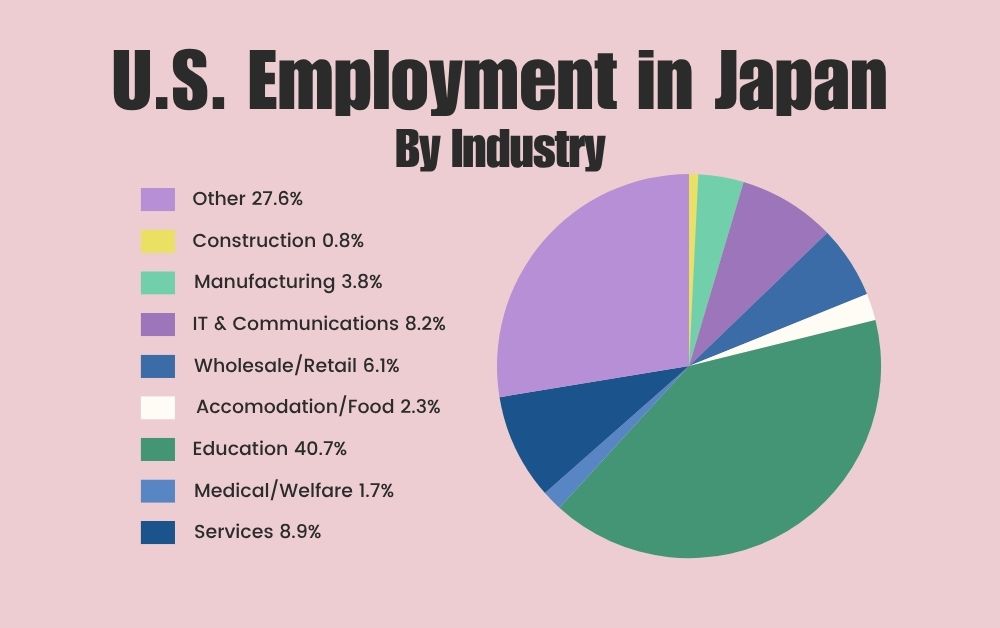
1. English Teacher
English teaching is the most common form of employment for many foreigners, or rather many foreigners get trapped in English teaching. Most can land a job teaching at cram schools and educational institutions by having a bachelor’s or associate’s degree of any kind. Many roles do not require any teaching certificates, so the barrier to entry is not too high. Based on the graph above, most Americans by far land jobs in the education sector, usually as English Teachers. If you enjoy and have a passion for teaching, Japan is one of the best places for employment. This is because the government is making drastic efforts to improve English literacy, so they are turning to foreigners to help bridge this gap.
2. IT Professional
If you have a background in development, design, data, or IT of any kind, Japan is fertile ground for employment. Currently, there is a huge demand for professionals with IT skills, and Japanese abilities are oftentimes not necessary. On average, a tech professional or software engineer usually earns around ¥7.7 million per year.
3. Translator or Interpreter
It’s no surprise that translation or interpreter-related roles are also highly valued, but these roles are rather limited in comparison to the others mentioned. The job of a translator is pretty versatile in Japan. Translators are required not only for English to Japanese translations but in many other languages as well. The gaming industry is one of the biggest sectors needing translators to overcome the language barrier. A good number of translators also do freelance assignments for brands, publishing houses, etc. The salary of a translator can vary depending on the skill level. Usually, the average translator makes about ¥3 million in a year.
4. Engineer
In the utopia of advanced technology, Japan undoubtedly stands as a key player. From manufacturing world-class automobiles to electronics, there’s so much to this country. It’s thriving and full of prospects. Companies dealing in cars or electronic items regularly have openings for engineers with excellent pay. An average engineer receives a salary of ¥7 million per year. Check out some of the best IT job sites in Japan.
Bridge the culture gap by learning Japanese at Coto Academy!
Japanese work culture values harmony, loyalty, and discipline, while Western workplaces focus on individuality and innovation. Both have strengths and weaknesses, but to succeed in Japan, mastering business Japanese and etiquette is essential—JLPT alone won’t get you far.
That’s where Coto Academy comes in. With small classes, a strong focus on practical conversational skills, and professional teachers, Coto specializes in helping students already working in Japan. Our business Japanese courses go beyond grammar, teaching the language, manners, and communication skills needed to succeed in Japanese companies.
If you’re serious about your career in Japan, Coto Academy is the best place to sharpen your Japanese and fit seamlessly into the workplace.
Ready to learn Japanese? Send us an inquiry today!
Check out:
- Top 10 Useful Phrases for Japanese Job Interviews
- How to Write a Japanese Resume (Rirekisho): Free PDF Template
- How to Get a Job in Japan as a Foreigner
- Common Japanese Job Interview Questions to Know
- Jobs You Can Do in Japan Besides English Teaching
- How to Exchange Business Cards in Japan: Meishi Koukan
- Introduction to Japanese Keigo
FAQ
What are the similarities between workplaces in Japan and America?
Japan and America have a couple of similarities as well. Both countries have very long workweeks. Japanese people are extremely hardworking and working overtime is not something strange to them. There is even an odd phenomenon known as karoshi, where people die due to overwork. Similarly, Americans spend most of their time at work and face similar experiences.
In both countries, employees prefer to take shorter vacations or time off from work. Japanese employees feel guilty when they don’t work. Just like that, most American employees stay devoted to their jobs.
How to overcome cultural differences while working in Japan?
Working in Japan can be an overwhelming experience. The cultural shock is quite strong when you first arrive. But it’s only a matter of time. You need to be patient, observant, and try your best in meeting the expectations. Make friends because having good companions will help you in your lonely moments. Keep navigating your way; you will eventually find yourself overcoming the cultural barrier.
Do Japanese companies hesitate to offer jobs to foreigners?
Some Japanese companies hesitate to offer jobs to foreigners. That is primarily because there is a vast difference between Japanese work culture and American or European work culture. They know very well that fitting into the Japanese environment will take time. Thus, Japanese companies prefer to recruit either local candidates or foreigners who are already stationed in Japan.
What are the perks of working in Japan?
There are several mandatory benefits provided to employees in Japan. These include:
- Dietary assistance
- Pensions (for old age, disability, and survivors)
- Maternity leave up to 14 weeks
- Paid leaves (at least 5 days a year)
- Insurance and compensation
